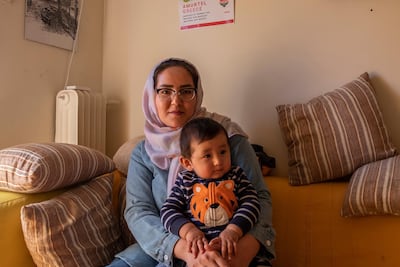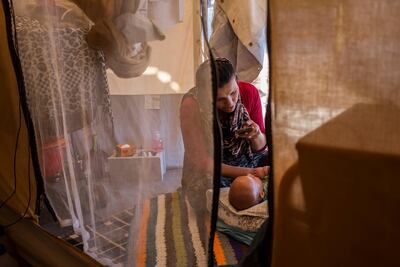What Tamim feared most in the moments after delivering her child by Caesarean section was having to return to Moria camp, where she and her husband lived on the Greek island of Lesbos.
Conditions were dirty and overcrowded – especially difficult for a new mother in a fragile condition with an infant.
“The toilet and everything wasn’t so clean, so I was worried about getting an infection,” she says.
It was also her first baby and she wasn’t sure what to expect in Greece after hearing mixed reports from women who had given birth at public hospitals on the islands as well as the mainland.
“I was really worried about how it was going to be,” she says.
The family now lives in an apartment in central Athens, a vast improvement on the overcrowded, dirty and increasingly dangerous camp. In Moria, women and girls face the constant threat of sexual violence.
Tamim and her husband are from Afghanistan, but they had been living in Iran as refugees for years prior to making the journey to Greece. When they arrived on Lesbos in 2017, the couple joined about 20,000 other asylum seekers and migrants in the infamous Moria camp, dubbed the world’s worst refugee camp by the BBC.
The conditions are difficult for all the inhabitants, but pregnant refugee women and new mothers are among the most vulnerable. Tamim and her husband stayed at Moria for nearly a year before they were transferred to mainland Greece months after the arrival of their first child.

The overburdening of Greece’s social welfare system has left it ill-equipped to cope with 115,000 asylum seekers currently registered as living within its borders.
Since the summer of 2015, more than one million asylum seekers and migrants from the Middle East and North Africa have arrived in Europe fleeing war, persecution, economic devastation and, increasingly, the effects of climate change.
During the height of these arrivals, most entered through Italy or Greece before travelling on to central and northern Europe, as Greece’s poor economy and weak social welfare system left few people wanting to remain in the country.
But in March 2016, that all changed. The border with Macedonia – now North Macedonia – slammed shut and the Dublin Act, which states that asylum claims must be registered in the country of first arrival, came back into effect. Thousands of asylum seekers subsequently had to claim asylum in Greece.
Although arrivals have fallen since 2015, there were still twice as many in January 2020 as in January 2019 – with 60 per cent of them women and children, according to the latest UNHCR figures.
Furthermore, “people can no longer leave for European countries under relocation,” said Boris Cheshirkov, the UNHCR spokesman in Athens. “Reunification for those who are in Greece with family members in other European member countries is slow [and] integration prospects are dim.”

Exacerbating an already precarious situation, over the summer of 2019 the newly elected Greek government revoked asylum seekers’ access to public healthcare, citing an overwhelmed welfare system. For pregnant women and new mothers, this was devastating.
Now, even routine check-ups during pregnancy had to be paid for, but, because refugee and migrant women often lack the means to afford health care, many go months, or even their entire pregnancies, without seeing a doctor.
“We see women in Amurtel who are maybe seven to eight months pregnant who have never had any sort of check-up,” said Rebecca Werwath, a part-time lactation consultant at Amurtel Greece, an international grassroots NGO for women.
Even more concerning is what happens to women after giving birth at a public hospital – an emergency expense still covered by the state. “They have to go back to the conditions where they carried the child, so it’s a very difficult situation for pregnant women and young mothers, and for infants and young children in general,” Mr Cheshirkov said.

On many of the islands, people live under tarpaulin in the exposed spillover camps surrounding the official ones.
“The fact is there are many women living in a very difficult position,” says Anna, a volunteer midwife at Amurtel. “There are women that are pregnant and are homeless, or they might have other children and are homeless.”
After six months, the Greek government decided to grant asylum seekers a provisional social security number that would allow those applying for asylum limited access to the healthcare system. But the pandemic has greatly complicated this new process, with offices closed and long delays.
Even after they navigate bureaucratic hurdles and difficult living conditions, expectant mothers face other challenges, including language barriers and the lack of family support. These women were used to having the support of their own mothers, sisters, female relatives … so there’s a huge gap for them,” Ms Werwath said.
The stressful environment means many refugee and migrant women find themselves unable to breastfeed and have to rely on formula milk, which is often too expensive. As a result, many end up diluting the mixture to make it last longer.
If, like Tamim, they have access to organisations such as Amurtel, they can get breastfeeding consultation sessions. “They come here and ask advice about how to give more milk, because they cannot afford to buy formula milk,” Anna said.
Yet, despite all of the obstacles refugee and migrant women face during their pregnancies, birth and postpartum, many women say that giving birth in Greece is still a huge improvement on giving birth in their home countries.
“Here is better, because in Afghanistan and in Iran we [women] don’t have rights,” said Asma, another refugee woman from Afghanistan who attends sessions at Amurtel. “But here they talk to us as humans and the behaviour is more humane.”

